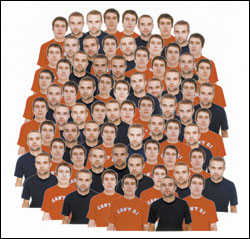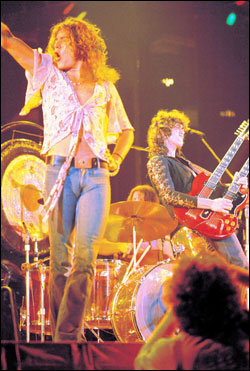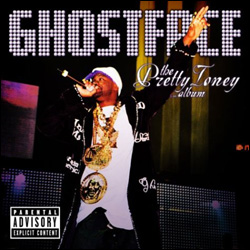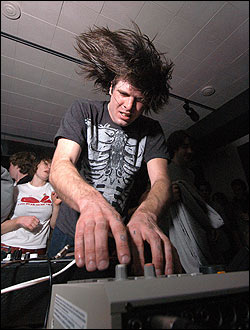There is very little in music (barring death, dismemberment, and urinating on 14-year-old girls) as disappointing as an artist chucking a perfectly good formula in the name of “growth.” What makes Spokes (Warp), the newest album by British post-dance duo Ed Handley and Andy Turner, aka Plaid, so frustrating is that it completely reneges on what once made them special. Plaid flitted between exquisite miniatures and extended beat workouts, coming over like ambient hip-hop or tikitronica, depending on the track. And while they occasionally crossed the paper-thin line that separates whimsical from twee, Plaid were almost always a bewitching alternative to a musicIDM, or “intelligent dance music”that so often was either wispy treacle or garbled gibberish.
Actually, Handley and Turner’s earliest (and arguably best) work came as pre-Plaid trio the Black Dog, in which they were joined by Ken Downie. The Black Dog imagined the breakbeat-driven rave anthems of the late ’80s and early ’90s as quirky Anglo-Asian kitsch, exotica for the post-E generation. Literally post, in that the Black Dog were among the first artists to be included in Warp’s Artificial Intelligence home-listening electronica push, i.e., the genre that would eventually evolve into IDM. Tracks like the Black Dog’s “Age of Slack” (the title alone conjures head nodding rather than body popping) and “Nort Route” by Balil (another of Handley and Turner’s endless supply of pseudonyms) smeared silly samples, keyboard vamps, and oft-beautiful melodies over looped, loping beats.
That playfulness has dissipated over the years, though. Blame the decline on the garbled gibberish that, when it comes to electronic music, is a code for “Autechre.” Whatever you think of their music, Autechrethe duo of Sean Booth and Rob Brownhave cast a larger shadow over IDM than any other artist save perhaps Aphex Twin or Squarepusher. (And no one takes drill and bassthe Pop Rocks version of pseudo-drum and bass that the Pusher pioneeredseriously anymore, especially now that Kid606 and his Tigerbeat6 label have made it safe for spotty white boiz to deface black music directly, without the intermediary of drill and bass’ arsenal of Benny Hill gags and fart jokes.) Autechre’s basic principleselectro-funk as music for insects, samples and beats spliced and chopped into jittering glyphs and ciphers, more textural information than any human could be expected to processhave made IDM’s gated-community version of popular music (copyright Peter Shapiro) a done deal.
OVER IN THE REALM of dance music that actually makes you move, modern drum and bass has become the beat-head music supreme, taking a snippet of epiphany and looping it for eternity, each repetition (ostensibly) gaining more accrued meaning/feeling/excitement. Some of the best tracks on Spokes have a submerged hardstep D&B vibe, but the key word is “submerged”usually, the beat is nearly drowned in all the stuff piled on top. Just as often, though, Plaid come up with some good, simple atmospherics and disrupt them with more of those double-time mandible-scraping drum tracks familiar from dozens of post-Autechre acts. “Even Spring,” the opening track, is as beautiful as anything I’ve heard this year, reminding me of Durutti Column’s “Otis”: It hollows out an old soul singer’s lament until this prime music-of-physicality is rendered disembodied, neutered. Until, of course, they just have to drop the chittering, chiming blip stuff at the midway point. “Zeal” creeps and crawls and settles with murky ambient scrapings and klangs, synthesized Bernard Hermann strings, and voices from the psych wardbefore, you guessed it, more zipped, ripped beats.
There are moments of real, unadulterated beauty here, and unsurprisingly, they’re closest to the Plaid of old. “B Born Droid” is Sinophile funk, an Orientalist dreamscape that reminds of the slower moments on the Dizzee Rascal album (and therefore Ca$h Money’s Mannie Fresh). But too often, as with “Cedar City,” the garish rhythms and textural excess render the heart-tugging, winsome openingreminiscent of Ryuichi Sakamoto’s score for The Wings of Honneamise (Sakamoto’s work with the Yellow Magic Orchestra was obviously a clear influence on Handley and Turner) comic or illegible. And they are suddenly too in love by half with those descending, creepy, and childlike chord sequences long since made clich頢y Aphex and Autechre.
IDM’s defining liability is precisely that it can “go anywhere.” For all of its practitioners’ rhetoric about the music’s endless possibilities, far too much IDM is far too comfortable telling old stories. What rankles in 2003 is not even the idea that IDM is stealing its best ideas from dance music proper, the way it did back in the, ahem, “heyday” of drill and bass. (There’s not much on Spokes to suggest any sort of dialogue with the wider world, even grudgingly.) IDM ismore than a decade onwell established enough to be cannibalizing itself. The once lionized “geniuses” of the movementAphex Twin, Squarepusher, Autechre, -ziq, most of whom certainly made genius recordsare now old hat. In response, they’ve decided to sound even more like themselves, nearly to the point of self-parody. Plaid always stood simultaneously slightly outside their peers’ purview and the prevailing fashions of the moment. So their “diversify or die” stance in the face of genre stagnation is all the more bewildering when you consider that they’re accomplishing it by stealing someone else’s clothes. Incest is taboo for a reason, you know.
Plaid play Chop Suey with Luke Vibert, Chris Clark, and DJ N.E.D. at 9 p.m. Tues., Nov. 18. $15 adv.








